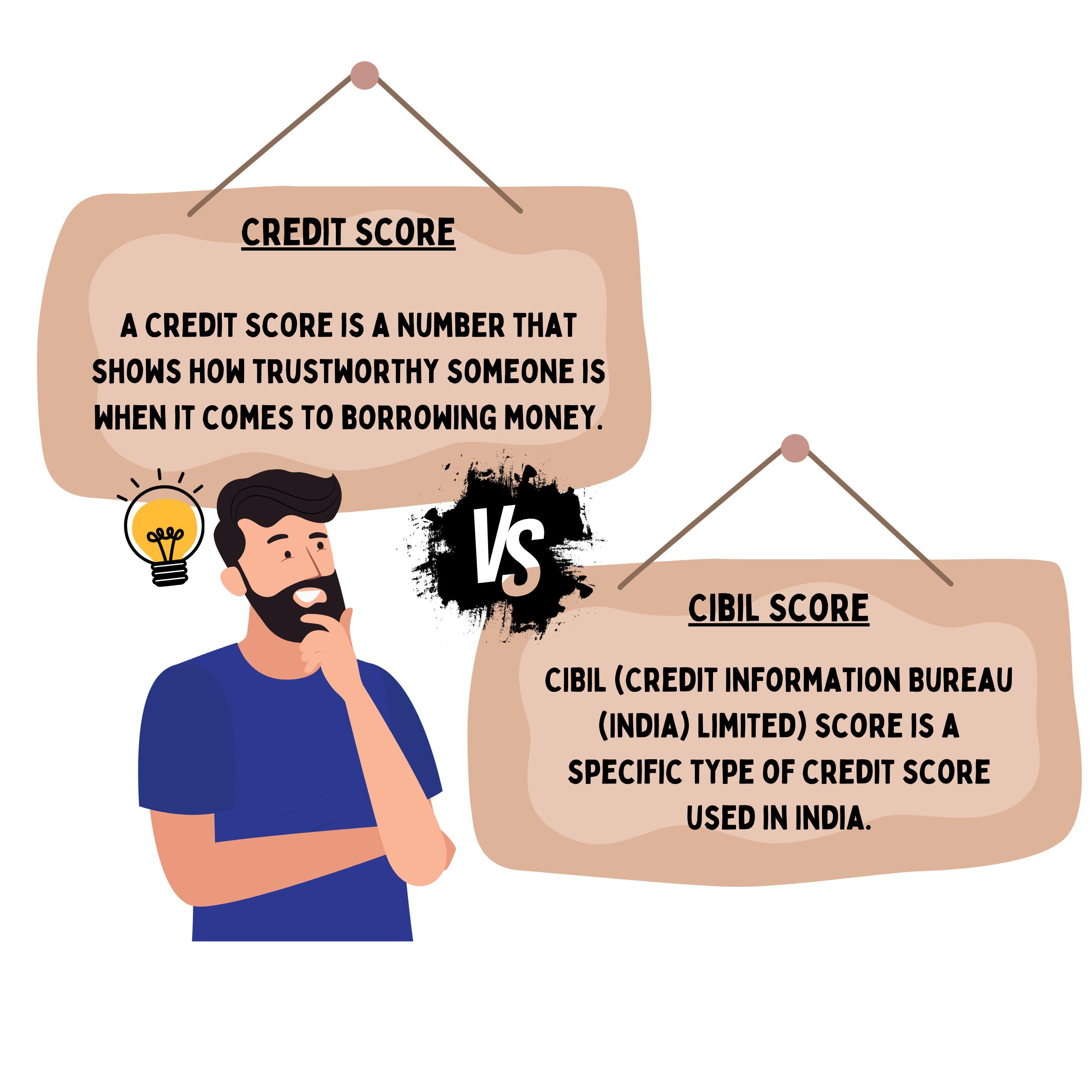Credit Score vs CIBIL Score: Easiest Way to Differentiate

Who doesn’t want to maintain a good credit history? A good credit history decides whether you’ll get favourable interest rates, easy loans, and the trustworthiness of banks.
That’s exactly why people prioritise making timely repayments and payments. While understanding the importance of a credit score is fine, telling this term apart from “CIBIL score” is equally important.
If you don’t understand the nuanced difference of credit score vs CIBIL score, we got you!
Here’s what we’ll be covering:
- What’s a Credit Score?
- What’s a CIBIL score?
- Credit Score vs CIBIL Score
- Factors That Influence Credit Scores
- Factors That Influence CIBIL Score
- How are CIBIL score and credit score calculated?
- Importance of Credit and CIBIL Scores
What’s a Credit Score?
Before understanding credit score vs CIBIL score, it’s crucial to understand what credit score really is. A credit score is a number that shows how trustworthy someone is when it comes to borrowing money.
The score is between 300 and 850, and the higher it is, the more reliable the person is seen as a borrower. Credit scores are generated by credit bureaus using a formula that considers various financial behaviours like payment history, credit utilisation, and length of credit history.
Now you know what a credit score is. But to get into the element of credit score vs CIBIL score, you still need to understand what a CIBIL score is. Let’s get to it!
What’s a CIBIL score?
CIBIL (Credit Information Bureau (India) Limited) score is a specific type of credit score used in India. It is provided by the CIBIL credit bureau and is widely accepted by lenders. Like a credit score, CIBIL scores range from 300 to 850, with higher scores reflecting better credit health.
Now is the time to finally get to credit score vs CIBIL score.
Credit Score vs CIBIL Score
After reading this section you’ll never nonchalantly use Credit Score and CIBIL score interchangeably.
Here’s the subtle difference between the two:
A credit score is a generic term used globally to assess a person’s creditworthiness. On the other hand, CIBIL score specifically refers to the credit score provided by the Credit Information Bureau (India) Limited (CIBIL) in India. So, while credit score is a broader concept, CIBIL score is a type of credit score used in the Indian context.
Now that you can tell credit score vs cibil score apart, let’s see the factors that influence credit scores and CIBIL scores.
Factors That Influence Credit Scores
You need to be aware of the factors that influence credit scores. It is usually a mix of the following:
- Payment History
- Credit Utilization
- Length of Credit History
- Types of Credit in Use
- New Credit
These factors are not different from a CIBIL score. Let’s see how!
Factors That Influence CIBIL Score
CIBIL scores are also influenced by similar factors, including payment history, credit utilisation, and the overall credit mix. Lenders in India primarily use CIBIL scores, so understanding these factors is crucial for maintaining good credit health.
This should help you with your understanding of how credit score and CIBIL score get affected. Now let’s see how the two of them are calculated.
How are CIBIL score and credit score calculated?
Credit scores, including CIBIL scores in India, are calculated based on various factors. Payment history, which reflects if you pay bills on time, holds significant weight. Credit utilization, the ratio of credit used to the total available, also affects scores.
The length of your credit history matters – longer histories are generally favorable. Types of credit, like credit cards and loans, impact scores, as does having a mix of them.
Lastly, recent credit activity, such as new accounts or inquiries, influences your credit score. Combining these elements, credit bureaus generate scores to assess your creditworthiness.
But another interesting question to ask is what does a particular credit score mean. Let’s take an example.
779 Credit Score Meaning
A credit score of 779 is really good. It falls into the “Very Good” category, which means you’re less risky to lend money to. People with this score usually get better deals on things like loans and credit cards because they have a history of paying their bills on time.
Only about 25% of people have a score in this range. It’s above the average score, and you may qualify for lower interest rates from lenders. Overall, 779 credit score meaning is excellent and opens up opportunities for better financial deals.
Okay, so you know how credit score vs CIBIL score are calculated. But how do these scores matter? Let’s see how.
Importance of Credit and CIBIL Scores
Your credit score:
- Determines loan eligibility
- Affects interest rates on loans
- Impacts credit card approvals
- May be considered by landlords and employers
Similarly, your CIBIL score is a key factor for lenders when assessing an individual’s creditworthiness. It plays a key role in:
- Loan approvals
- Interest rate determination
- Overall financial trustworthiness.
Now that you know comprehensively what credit score vs cibil score is, factors that influence them, how they are calculated, and even what 779 credit score meaning is, you’ll be able to make sound financial decisions pertaining to your credit history.
Realise this: when it comes to your financial planning, the devil is in the detail, make sure you get the details (nuances) right. If you want more such nuanced guides, follow NewsCanvass for more.









